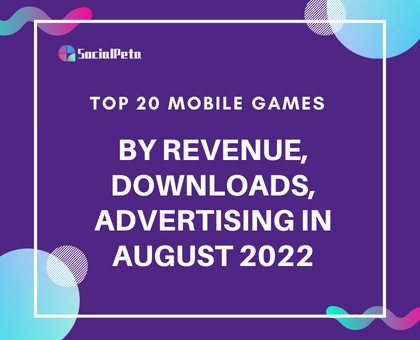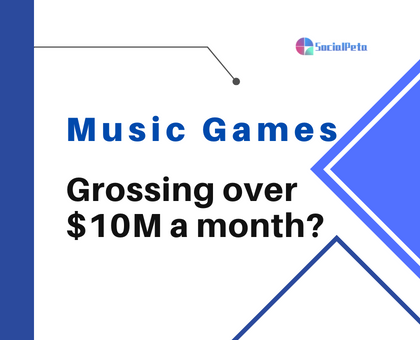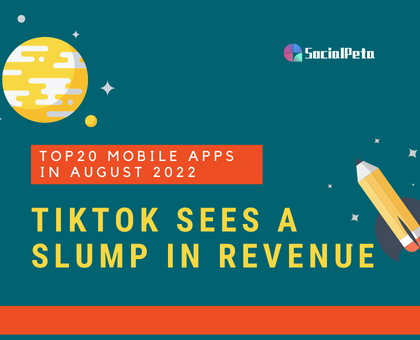How did social media apps become super money magnets in India?
According to TechCrunch's report in August, India's mobile phone users spend nearly 5 hours per day on apps, ranking 5th among the 17 major markets around the globe. What apps do these Indian "Internet addicts" mainly use and on what apps are they most willing to pay? SocialPeta analyzed the top 10 Indian social apps in downloads and revenue in the past 6 months to help people in the mobile app industry to understand the current status and trend of the social app market in India.
In general, popular social apps in India possess the following characteristics:
- Offer Lite versions: the small installation packages can run smoothly under low Internet speed, making them suitable in markets in lower-tier cities
- Support multiple languages: India has 22 official languages and all local apps in India support over 15 language environments
- Provide the "money-making" mode: encourage users to earn money by recommending apps and creating content
- Value optimizations of the live-streaming feature and experiences: including real-time chat, live room special effects, etc.
- Show a clear trend of integration between social networking and e-commerce: the number of platforms showing the intent of cooperation and reaching cooperation is increasing this year
The user-attraction and money-making abilities of specific apps will be analyzed below using the top 10 list of downloads and revenue in India in the past 6 months.
Instagram: A window on the world for young people
[Instagram] topped the download ranking with a huge number of users and a fast growth rate in downloads, up 77.79% QoQ in the last 6 months. [Instagram Lite], the light version of [Instagram], ranked 4th on the download rankings with a 74.37% growth. [Facebook] and [Facebook Lite] were also listed on the rankings. It's quite clear that Indian users have a huge demand for lite apps. As for this reason, about 86% of Internet users in India come from places other than first and second-tier cities and lite versions are necessary to give them a satisfactory experience under the complicated and unstable Internet environment there.
In the past 6 months, [Instagram] has launched several measures for "Safety Protection of Minors" in India, including parent supervision tools, age verification plan, etc., and it added sensitive content settings in the new version released in June to shield users under the age of 16 from unhealthy content. These measures are not set specifically for India, of course, and localization is no longer the focus of [Instagram]. For an app with such a huge user base, [Instagram]'s focus in the current phase is to provide an international vision and this strategy is reflected in its ad releases.
According to the Popular Creative Analysis Model of SocialPeta, the best-performing creative of [Instagram] in the past 6 months is worth 103.4M and it was only released for 38 days. The ad is about an Indian girl getting inspired when color painting cups and coming up with several ideas about manicures. The ad text highlights creativity and innovation.
By further analyzing popular ads, we summarized the following general features of them:
- The creatives were all released on YouTube
- The creatives are mainly about fashion, cosmetology and dancing
- The number of creatives using English is five times as much as those using Hindi
All these features aim at "internationalization" and they have made [Instagram] a window for young people in India to keep up with international fashion trends. [Instagram]'s success is built on its international nature and its 230-million user base in India. Coincidentally, all of India's local social apps are catering to the preferences of Indian people.
ShareChat: The maturing Indian version of Instagram
Among local social apps developed by Indian companies, [ShareChat] had the highest downloads. It adopted a similar approach as [Instagram]—encouraging users to create content and share with each other. As India's first dialect social app, [ShareChat] supports 15 dialects, accounting for 75% of all languages in India. Its interfaces are very straightforward and friendly to new users, allowing it to quickly penetrate low-tier cities in India.
As a native-born social app, [ShareChat] did more than that to care for its local users. It launched [ShareChat Lite] and also developed a self-adapting code stream distribution technology (which packages content of various resolutions and distributes it to terminal players that then choose the appropriate version) to optimize users' watching experiences. What's more, [ShareChat] also offers money-making opportunities to its users, including rewards for recommended downloads, ad commissions, creator rewards, etc. There are even tutorials online teaching people how to make more money on ShareChat.
Judging from its recent actions, live-streaming and e-commerce are the main focuses of [ShareChat] now. In its updated version released on October 14, it launched the "Surprise Chest" feature, allowing users to accumulate live-streaming duration to exchange for gifts, and it also added the live room entrance special effects and full-screen gift effects. ShareChat's CEO mentioned in an interview, "Video e-commerce will be our main focus in the next two years and a large portion of our revenue will come from this field by the end of 2022." According to WATConsult's report on India's digital commerce, about 146 million users in India make purchases and transactions on social platforms, accounting for nearly 49% of all e-commerce users in India, and the size of this group is expected to rise to 216 million by the end of 2022.
In terms of marketing, [ShareChat] attracts users by enhancing their sense of identity in emotions and faith. According to SocialPeta's Popular Creative Analysis Model, the most popular ad in the last 6 months is a video celebrating Maha Shivaratri. Siva is one of the three major gods of Hinduism and enjoys a lofty status. This strongly religious video gained the recognition of a huge number of Indians and achieved over 17.5M views and 133K Likes in less than 2 months.
Moj: Successfully emerged as TikTok's successor
Replicas of [TikTok] sprung up like mushrooms when India banned [TikTok] 2 years ago. The strongest contestant among them is [Moj] developed by [ShareChat]'s parent company and it's the well-deserving champion in this contest of imitation from designs of gameplay and interfaces to video recording tools and camera filters.
Similar to [ShareChat], [Moj] also allows users to make money with it. In addition to commissions for recommended downloads, it also has a Watch Ads for Money mode. All these earnings are highlighted in application stores, reflecting the huge attraction of "money-making" to Indian users.
In terms of marketing, [Moj] cooperated with celebrities to lift its profile. According to SocialPeta's Popular Creative Analysis Model, [Moj]'s most popular ad is a product endorsement poster featuring Indian female star Shahnaz Gill and carrying the words "India's largest short video app" and a striking download guide. This ad was released for 356 days and achieved impressions of more than 10M.
In March this year, [Moj] announced its cooperation with Flipkart, one of the largest e-commerce platforms in India, allowing users to access [Flipkart] for shopping directly through [Moj]. This cooperation is called by Indian media "further optimization of users' experiences on social platforms".
Cooperating with e-commerce platforms is definitely the most efficient way to "make users pay". In a market with huge demands for social networking, however, this isn't the only way for apps to earn money. In the top 10 list of revenue in India, video chat apps and short video apps had almost equal shares. Why are users willing to pay money for them? Please keep reading.
Chamet: Paid chatroom for high-quality bachelors
[Chamet], a video chat app, has been topping the revenue list in the last 6 months with QoQ growth of 510.74%. It offers 5 top-up options: $0.99 for 4500 Diamonds, $2.99 for 51000 Diamonds, $9.99 for 45000 Diamonds, $29.99 for 135000 Diamonds and $99.99 for 450000 Diamonds. Taking the lowest price, for example, $1 allows a user to chat for 2 minutes. Its download and revenue data shows that each download brought $1.53 in revenue, meaning that each user chats for over 2.5 minutes on average after the download.
[Chamet] has done the following to attract Indian users to spend time on it and pay to chat:
- It offers smooth and friendly experiences: for example, new users are offered one free trial use; the chat messages are automatically translated into the system languages of users' phones to facilitate communication; it allows users to make video calls with any other users and has a "Fast Match" feature for quick random matching
- Diversified consumption scenes: in addition to the regular paid chat, users can also create video chatroom and send gifts, thus satisfying the demands of different users
- Customized top-up options: given the same amount, multiple top-ups of small amounts are better than one-time large amount top-up. This is very much in line with Indian users' consumption habits
It's also worth mentioning that [Chamet] added a "Live Room Music" feature in its latest updated version released on October 13. It turned out to be a great measure of optimizing user experiences while increasing revenue.
Tiki: stay close to the people and be friends with the governments
With a 758.72% QoQ growth in revenue in the past 6 months, [Tiki] surpassed [Chamet], the No.1 money-making app with a 510.74% QoQ growth in revenue. As a short video app, [Tiki]'s revenue mainly comes from the shares of creators' commissions and it has been doing quite well in encouraging creators and getting support from governments.
In March this year, this short video app that was launched less than 2 months organized the first "Tiki Star Award" event to commend users showing their talents on the app from around the country and the winners were selected via online voting. Ian Goh, Tiki's CEO, stated several times in public, "Our vision is to create a real community for talents and our mission is to support these brilliant creators." This can also be seen in its marketing strategies.
According to SocialPeta's Popular Creative Analysis Model, [Tiki]'s ad with the longest release in India was a video showing several Indian girls of different styles singing and dancing.
This video isn't so well-edited and the girls' performance can still be improved. However, a performance in a daily scene lived by ordinary people can better arouse common users' creation impulses, and it also shows the platform's fair support for common creators.
India's social media often has a strained relationship with the governments, but [Tiki] knows how to use its influence to build a conducive relationship with governments and gain potential support. In August, [Tiki] collaborated with Bhumi, a well-known civil organization in India, to organize a series of community welfare events to celebrate the 75th anniversary of India's independence, including giving out food, seedlings and transport safety publicity.
On September 12, [Tiki] launched its new feature "Live Room Real-Time Chat" and optimized the live-streaming screen quality, as mentioned in its update info, both showing the app's focus on bettering users' live-streaming experiences. Meanwhile, [Tiki] also plans to start it social e-commerce business. Ian Goh mentioned that [Tiki] will launch its e-commerce services in 2022 Q4 or 2023 Q1.





